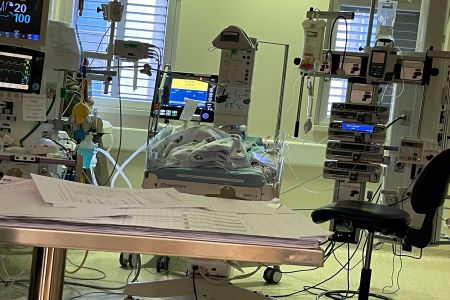

His name is Sirage. He was born at Hadassah Hospital Ein Kerem with a congenital heart defect a little more than two months ago.
Prof. Uri Pollack, head of Pediatric Critical Care and director of the Pediatric Cardiac Critical Care Unit explains that, at birth, the attending medical staff immediately realized something was seriously wrong with the baby. They quickly called in a team of pediatric specialists and Sirage was moved to the Pediatric Intensive Care Unit (PICU).
Four days after his birth Sirage was placed on an ECMO (extracorporeal membrane oxygenation) machine that took over his heart and lung function while he underwent heart surgery. ECMO machines tend to be available only in large hospitals like Hadassah because they are expensive and require large teams of specialists to operate them.
We are happy to share with you that Sirage is now doing very well in the PICU.
What is unusual about his care at Hadassah is that the members of his family who live in East Jerusalem are deeply involved in his hour-to-hour treatment. Someone is continually at his side. Besides his nurses and doctors, his mother is with Sirage 24/7. There is a bed set up for her in his room. When his father can stay overnight too, a room is set up for him just up the hall.
Hadassah administrators and staff understand that the patient’s family has a vital role to play in helping the patient recover. For an infant, they believe the parents’ proximity and the bonding that ensues is crucial.
For Hadassah’s PICU, 2022 has been one of the busiest years ever, with 1,000 children admitted so far this year. Of these 250 required open heart surgery. Most of these children had congenital cardiac issues, while others had cardiac infections or genetic problems.
Currently, some of the 12 active beds in the PICU are used several times a day as the young patients recover from surgery and are moved to the regular non-intensive care units.
Half of these little patients are Palestinian, and half are Israeli. They are all treated equally by the dedicated staff, who work as teams comprised of different pediatric specialists. It matters not if the staff commute from Hebron, Bethlehem, or Jerusalem. They are Arabs and Jews working together, dedicated to saving the fragile little lives entrusted to their care at the Hadassah hospitals. They are the heartbeat of Hadassah and the reason that Sirage will be able to grow up to be a healthy child.
